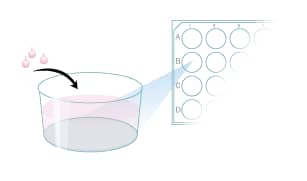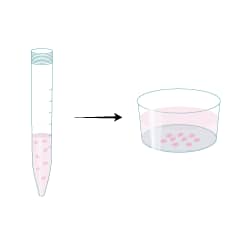CellXVivo Mouse Th1 Cell Differentiation Kit
CellXVivo Mouse Th1 Cell Differentiation Kit Summary
Kit Summary
For the differentiation of Th1 cells from a preparation of CD4+ T cells isolated from mouse splenocytes.
Key Benefits
- Provides optimized reagents needed to induce Th1 differentiation
- Yields ~80 x 107 CD4+ T cells, of which 70-90% are IFN-γ+ Th1 polarized
- Contains high quality bioactive proteins
- Includes straightforward procedures
- Does not require specialized instrumentation
Why Expand and Differentiate Mouse Th1 and Th2 Cells Ex Vivo?
T helper type 1 (Th1) cells are a lineage of CD4+ effector T cells that promote cell-mediated immune responses against intracellular viral and bacterial pathogens. Enhanced Th1 responses are associated with autoimmune diseases including rheumatoid arthritis, multiple sclerosis, inflammatory bowel disease, and type-1 diabetes. Differentiation of CD4+ effector T cells into the Th1 lineage is promoted by cytokines such as IL-12 and IFN-gamma. Th1 cells secrete IFN-gamma, IL-10, and TNF-alpha. The CellXVivo™ Mouse Th1 Cell Differentiation Kit contains optimized reagents for Th1 differentiation from naïve CD4+ cells.
This kit contains the following reagents for the ex vivo differentiation of mouse Th1 cells.
- Hamster Anti-Mouse CD3, Th1
- Mouse Th1 Reagent 1
- Mouse Th1 Reagent 2
- Mouse Th1 Reagent 3
- Mouse Th1 Reagent 4
- Reconstitution Buffer 1
- Reconstitution Buffer 2
- 20X Wash Buffer
The quantity of components in this kit is sufficient to differentiate approximately 8 x 106 naïve CD4+ T cells, and generate 8 x 107 CD4+ cells of which 70-90% are IFN-gamma+ Th1 polarized cells.
Note: Results may vary due to strain, age, and/or the health of the mice used for isolation.
Stability and Storage
Store the unopened kit at ≤-20 °C. Do not use past the kit expiration date.
Limitations
- FOR LABORATORY RESEARCH USE ONLY. NOT FOR USE IN DIAGNOSTIC PROCEDURES.
- The safety and efficacy of this product in diagnostic or other clinical uses has not been established.
- This reagent should not be used beyond the expiration date indicated on the label.
- Results may vary due to variations among cells derived from different donors.
Specifications
Product Datasheets
Scientific Data
 View Larger
View Larger
Th1-differentiated Mouse CD4+ Cells Secrete High Levels of IFN-gamma. Mouse naïve CD4+ T cells were differentiated for 6 days using the reagents included in this kit. On day 6 of differentiation cells were harvested and re-stimulated with Anti-Mouse CD3 and Anti-Mouse CD28 overnight. The cell culture supernatant was collected and cytokine secretion was determined using the Mouse IFN-gamma Quantikine®ELISA Kit (Catalog # MIF00), the Mouse IL-4 Quantikine®ELISA Kit (Catalog # M4000B), and the Mouse IL-17 Quantikine® ELISA Kit (Catalog # M1700).
 View Larger
View Larger
Upregulation of T-bet, TNF-alpha, and IL-18R alpha in Th1-polarized Mouse CD4 Cells. Mouse CD4 cells were isolated and differentiated into Th1 cells using the CellXVivo™ Mouse Th1 Cell Differentiation Kit. Differentiated mouse Th1 cells (A, B, C) and naïve mouse CD4 cells (D, E, F) were analyzed by flow cytometry for (A, D) T-bet expression using Human T-bet/TBX21 Alexa Fluor®488-conjugated Antibody (Catalog # IC53851G), (B, E) TNF-alpha expression using Mouse TNF-alpha PE-conjugated Antibody (Catalog # IC410P), and (C, F) IL-18R alpha expression using Mouse IL-18 R alpha /IL-1 R5 APC-conjugated Antibody (Catalog # FAB1216A). Cells were also gated on CD4 expression using the Mouse CD4 Alexa Fluor®700-conjugated Antibody (Catalog # FAB554N). Differentiated mouse Th1 cells were stimulated with Cell Activation Cocktail (Tocris®, Catalog # 5476) for 4 hours prior to antibody staining. Quadrants were determined by naïve CD4 T cells expression levels.
 View Larger
View Larger
Intracellular Cytokine Staining of Differentiated Mouse Th1 Cells. Flow cytometry data of mouse naïve CD4+T cells (A, C) and differentiated Th1 cells (B, D) generated using reagents included in this kit. After 6 days of differentiation, naïve CD4+cells or differentiated Th1 cells were stimulated with Cell Activation Cocktail (Tocris®, Catalog # 5476) and stained with conjugated Anti-Mouse IFN-gamma (R&D Systems, Catalog # IC485), Anti-Mouse IL-4 (Clone 11B11), and Anti-Mouse IL-17A (Novus Biologicals, Catalog # NBP1-72027) Monoclonal Antibodies. Quadrants were set based on isotype-stained controls.
Assay Procedure
Refer to the product datasheet for complete product details.
Briefly, CD4+ T cells isolated from mouse splenocytes are differentiated ex vivo into the Th1 phenotype with reagents provided in this kit and using the following procedure:
- Isolate CD4+ T cells from mouse splenocytes
- Culture CD4+ T cells in reagents provided in kit
- Verify Th1 cell expansion after 6 days in culture
This kit contains the following reagents for the ex vivo differentiation of mouse Th1 cells.
- Hamster Anti-Mouse CD3, Th1
- Mouse Th1 Reagent 1
- Mouse Th1 Reagent 2
- Mouse Th1 Reagent 3
- Mouse Th1 Reagent 4
- Reconstitution Buffer 1
- Reconstitution Buffer 2
- 20X Wash Buffer
Reagents
- Laboratory mice
- X-VIVO™ 15 Chemically Defined, Serum-free Hematopoietic Cell Medium (Lonza, or equivalent)
- MagCellect™ Mouse Naïve CD4+ T Cell Isolation Kit (R&D Systems, Catalog # MAGM205, or equivalent)
- Penicillin/Streptomycin (optional)
- Cell Activation Cocktail 500X (Tocris®, Catalog # 5476)
Equipment
- Tissue culture plates and/or flasks
- Sterile deionized water
- Pipettes and pipette tips
- Inverted microscope
- Hemocytometer
- 37 °C, 5% CO2 incubator
- Centrifuge
Protocol for mouse Th1 cell differentiation using the CellXVivo™ Mouse Th1 Cell Differentiation Kit.
Note: Results may vary due to strain, age, and/or the health of the mice used for isolation.
Coat the desired tissue culture plate with Hamster Anti-Mouse CD3,
Th1 antibody.

Isolate mouse splenocytes.

Isolate mouse naïve CD4+ T cells from splenocytes (e.g., using magnetic cell selection).

Perform a cell count.

Suspend 1 x 106 naïve CD4+ T cells/mL in Mouse Th1 Differentiation Media. Culture the cells on plates pre-coated with Hamster Anti-Mouse CD3 antibody.

Harvest cells on day 3.
Dilute cells 1:10 with fresh Mouse Th1 Differentiation Media.
Culture cells in a new flask for an additional 3 days.

Verify Th1 cell differentiation by analyzing cytokine expression via flow cytometry or ELISA (optional).

Citations for CellXVivo Mouse Th1 Cell Differentiation Kit
R&D Systems personnel manually curate a database that contains references using R&D Systems products. The data collected includes not only links to publications in PubMed, but also provides information about sample types, species, and experimental conditions.
3
Citations: Showing 1 - 3
Filter your results:
Filter by:
-
Inhibition of pyruvate dehydrogenase kinase 4 in CD4+ T cells ameliorates intestinal inflammation
Authors: H Lee, JH Jeon, YJ Lee, MJ Kim, WH Kwon, D Chanda, T Thoudam, HS Pagire, SH Pagire, JH Ahn, RA Harris, ES Kim, IK Lee
Cellular and Molecular Gastroenterology and Hepatology, 2022-10-10;0(0):. 2022-10-10
-
tRNA-m1A modification promotes T cell expansion via efficient MYC protein synthesis
Authors: Y Liu, J Zhou, X Li, X Zhang, J Shi, X Wang, H Li, S Miao, H Chen, X He, L Dong, GR Lee, J Zheng, RJ Liu, B Su, Y Ye, RA Flavell, C Yi, Y Wu, HB Li
Nature Immunology, 2022-09-22;0(0):. 2022-09-22
-
SOX-5 activates a novel ROR&gammat enhancer to facilitate experimental autoimmune encephalomyelitis by promoting Th17 cell differentiation
Authors: Y Tian, C Han, Z Wei, H Dong, X Shen, Y Cui, X Fu, Z Tian, S Wang, J Zhou, D Yang, Y Sun, J Yuan, B Ni, Y Wu
Nature Communications, 2021-01-20;12(1):481. 2021-01-20
FAQs
No product specific FAQs exist for this product, however you may
View all Cell Culture Product FAQsReviews for CellXVivo Mouse Th1 Cell Differentiation Kit
Average Rating: 5 (Based on 3 Reviews)
Have you used CellXVivo Mouse Th1 Cell Differentiation Kit?
Submit a review and receive an Amazon gift card.
$25/€18/£15/$25CAN/¥75 Yuan/¥2500 Yen for a review with an image
$10/€7/£6/$10 CAD/¥70 Yuan/¥1110 Yen for a review without an image
Filter by:

